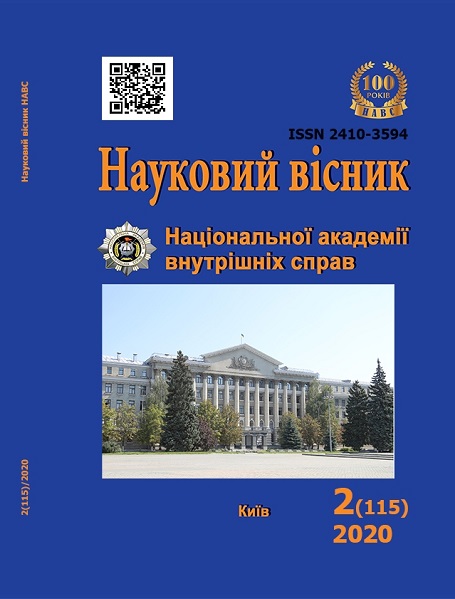Extended Producer Responsibility as a Basic Principle of a Modern Waste Management System: Prospects of Legal Regulation in Ukraine
Abstract
The purpose of the article is to consider the extended responsibility of the producer as one of the key principles of the European waste management system, as well as the analysis of the best practices for its implementation in the context of approximation of Ukrainian legislation to relevant EU standards. The objectives of the study are: 1. Establishing the essence of the principle of extended liability of the manufacturer and consideration of forms of such liability. 2. Acquaintance with the experience of Germany on the implementation of this principle. 3. Analysis of the state of Ukrainian legislation and relevant legislative proposals. The research methodology is based on philosophical and general scientific principles of cognition (formal logic, comprehensiveness, objectivity, systematization, etc.), as well as methods of analysis, synthesis, scientific comparison and generalization. The legal bases of the study are provided by EU Directives, national legislation of individual European countries and relevant legislation of Ukraine. The information base of the study consists of statistical, sociological and other information on the specified topic. The scientific novelty of the study is to systematize views on extended producer responsibility (principle, strategy, tool or mechanism of waste management, environmental policy approach), consider the latest legislative trends in the implementation of this responsibility in the EU, identify features of the German DSD and assess the prospects in Ukraine. Conclusions: principle of extended producer responsibility is one of the main principles of the waste management system in a circular economy, respectively, which is a key principle of the European waste management system. One of the best-extended producer responsibility systems in Europe is the German Dual System (DSD), an important condition for which was the existence of an effective municipal waste management system. Therefore, the introduction of an extended producer responsibility system without changing the entire waste management system in the country cannot lead to the expected consequences. The analysis of legislative initiatives in this area shows, on the one hand, the state’s attempt to shift the entire burden of creating a system of extended liability on producers, and on the other – the bills contain blocking rules that call into question the beginning of such a system. Taking into account economic, technical, and environmental and other factors, when creating a system of extended producer responsibility, the state must participate in this process through a series of technical, administrative and tax measures while launching a waste management system based on European principles.
Keywords: waste; principle; extended producer responsibility; DSD; waste management system; recycling.
Downloads
References
ahre BDE (1961–2001). Von der Stadthygiene zur Kreislaufwirtschaft eine Zeitreise mit der Entsorgungswirtschaft. WAS Druck, 2001. 195 s.
Бабак А. В., Слабий В. Г. Розширена відповідальність виробника за відходи упаковки. Упаковка. 2016. № 3.
C. 47–49.
Directive 2008/98/EC of the European Parliament and of the Council of 19 November 2008 on waste and repealing certain Directives. Official Journal of the European Union. 2008. L. 312.
Хлабистова К. В., Гулак О. О. Принципи управління відходами та ресурсами у країнах ЄС. Наукові
записки Інституту законодавства Верховної Ради України. 2019. № 5. С. 46–52. doi: https://doi.org/10.32886/instzak.2019.05.05.
Lindhqvist T. Extended Producer Responsibility as a Strategy to Promote Cleaner Products (1–5). Lund : Department of Industrial Environmental Economics, Lund University, 1992.
Lindhqvist T. Extended Producer Responsibility in Cleaner Production: Policy Principle to Promote Environmental Improvements of Product Systems. IIIEE, Lund University, 2000.
Mwanza Bupe, Mbohwa Charles. Strategies for Enhancing Extended Producer Responsibility Enforcement: A Review. 2019. doi: https://doi.org/10.33796/waberconference2019.66.
Михайлова Є. О., Панчева Г. М., Резніченко Г. М. Ефективні механізми поводження з твердими побутовими відходами в Україні. Комунальне господарство міст. 2019. Т. 5. № 151. С. 37–44. doi: 10.33042/2522-1809-2019-5-151-37-44.
Про управління відходами : проект Закону України від 16 жовт. 2019 р. URL: http://w1.c1.rada.gov.ua/ pls/zweb2/webproc4_1?pf3511=67094.
Система управління відходами і розширена відповідальність виробника. Проект Twinning. 2016. URL: http://twinningweee.com.ua/sites/default/files/media/systema_upravlinnya_vidhodamy_i_vidpovidalnist_vyrobnyka.ppt.
Таранцова А. Розширена відповідальність виробника – основа економіки замкненого циклу. Екофорум. Львів. 2018. URL: https://eco-forum-lviv.com.ua/wp-content/uploads/2018/10/2_4-Tarantsova.pdf.
Тевкун Т. Мініреволюція в сфері управління відходами: все заради циркулярної економіки. 2019. URL: https://promusor.com/info/articles/zakonodatelstvo/law_9.
Угода про асоціацію між Україною, з однієї сторони, та Європейським Союзом, Європейським співтовариством з атомної енергії і їхніми державами членами, з іншої сторони : міжнар. док. від 27 черв. 2014 р. URL: https://zakon.rada.gov.ua/laws/card/984_011.
Україна потрапила в топ-10 країн із найбільшим обсягом сміття на кожного жителя. Gordonua. 2019. URL: https://gordonua.com/ukr/news/society/-ukrajina-potrapila-v-top-10-krajin-z-najbilshim-obsjagom-smittja-na-kozhnogo-meshkantsja-1118854.html.
Xevgenos D., Papadaskalopoulou C., Panaretou V., Moustakas K., Malam D. Success Stories for Recycling of MSW at Municipal Level. Waste Biomass Valor. 2015. No. 6. P. 657–684.
Abstract views: 146 PDF Downloads: 195
- Authors reserve the right to authorship of their own work and transfer to the magazine the right of the first publication of this work under the terms of the Creative Commons Attribution License, which allows other persons to freely distribute published work with mandatory reference to authors of the original work and the first publication of an article in this magazine.
- Authors have the right to enter into separate additional agreements on non-exclusive dissemination of the work in the form in which it was published in the journal (for example, to post an article in the institution's repository or to publish as part of a monograph), provided that the link to the first publication of the work in this journal is maintained.
- The journal's policy allows and encourages the posting of articles by authors on the Internet (for example, in electronic storehouses of institutions or on personal websites), both before the submission of this manuscript to the editorial office and during its editorial processing, as this contributes to the creation of a productive scientific discussion and positively affects the efficiency and dynamics of citing the published work.




